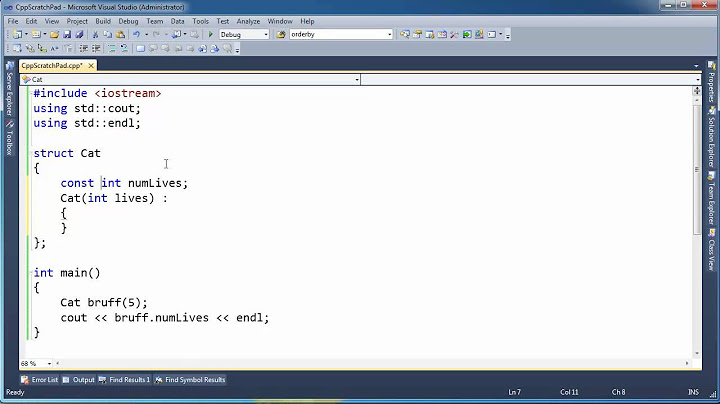Could not convert from '<brace-enclosed initializer list> to
10,710
You must initialize the 'b' like this:
B b = {
{ "foo", A{"bar"} }
};
Because {"foo", "bar"} is of type {string, string} instead of {string, A}
Related videos on Youtube
Author by
SH.0x90
Updated on June 04, 2022Comments
-
 SH.0x90 almost 2 years
SH.0x90 almost 2 yearsI know that has a lot of questions similar, but I saw them and none of them helped me, I think is that because mine is kind of different, and at the same time weird.
I made another question and a member answered to me, but instead of using classes he used structs. and it's working perfectly, but when I try to put it as classes, using the same logic, this is what happen, the error:
error: could not convert '{{"foo", "bar"}}' from '<brace-enclosed initializer list>' to 'B'
I tried, but I don't know what is happening.
#include <iostream> #include <map> class A { public: A() {} A(const std::string & input) : data(input) {} private: std::string data; }; class B { public: B(); B(std::initializer_list<std::pair<std::string, A>> input) : container(begin(input), end(input)) {} private: std::map<std::string, A> container; }; int main( int argc, char ** argv ) { B b = { {"foo", "bar"} }; return 0; }Also the answer of the member here: Ideone
Thank you all.
-
 chris about 10 yearsA string literal to an
chris about 10 yearsA string literal to anAis two user-defined conversions, so that's not going to work implicitly. -
 SH.0x90 about 10 yearsYes, you are right, I just tried this removing the "bar" and putting std::string("bar") and it worked. Do you have a solution to this work in both ways?
SH.0x90 about 10 yearsYes, you are right, I just tried this removing the "bar" and putting std::string("bar") and it worked. Do you have a solution to this work in both ways? -
 chris about 10 yearsYou could make an overload of
chris about 10 yearsYou could make an overload ofA's constructor that takes aconst char *and delegates to the other one. -
Adam H. Peterson about 10 yearsThe only difference between
structandclassis default access:publicversusprivate. (In fact, the only time I ever use theclasskeyword anymore is with template-template parameters.) Do you mean aggregate versus non-aggregate? -
 SH.0x90 about 10 yearsI prefer to use classes sometimes because of the encapsulation, and it's a thing that I REALLY care about. Nut there are situations that you can use for sure the structs without concern.
SH.0x90 about 10 yearsI prefer to use classes sometimes because of the encapsulation, and it's a thing that I REALLY care about. Nut there are situations that you can use for sure the structs without concern. -
Adam H. Peterson about 10 yearsYou can get the same encapsulation with
structyou can withclass. If the first thing you're going to do is putpublic:at the top, there's not really any effective difference.
-





